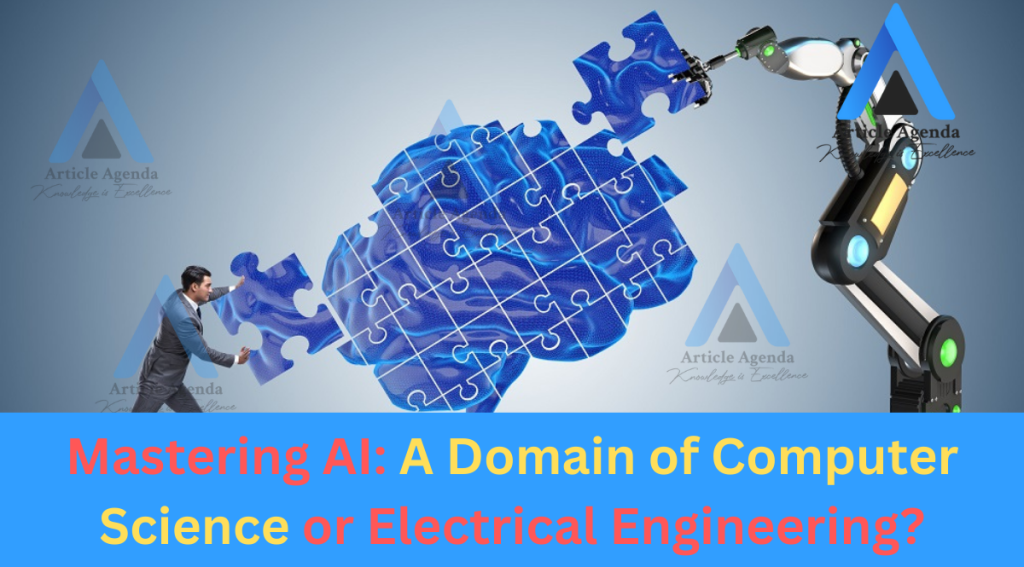Artificial Intelligence (AI) stands as the cornerstone of a technological revolution, but the bricks of its domain appear scattered across the academic spectrum. While AI is the offspring of computer science, its formative years were shared with electrical engineering. How do aspiring AI enthusiasts decide which academic route to take? In this in-depth exploration, we aim to clarify the subject of AI within the contexts of computer science and electrical engineering, focusing on the unique learning paths and career prospects of each.
You must map your educational route before you embark on your journey to command AI. Will you lay your roots in the practical applications of electrical engineering or delve into the complex algorithms of computer science? Let’s unravel the artificial intelligence problem.
Table of Contents
Introduction: Defining AI’s Protocol
Artificial Intelligence isn’t just a buzzword; it’s a technological marvel shaping our future. The capacity to mimic cognitive functions such as learning and problem-solving has given rise to capabilities that were once the realm of science fiction. As we strive to understand AI, we’re faced with the luminous question: in which domain does AI truly belong?
AI in Computer Science: The Brain Without Wires
In the world of algorithms and programming languages, AI within computer science is the heartbeat of data computation. We begin our assessment with an overview of AI within this traditional domain, exploring the core concepts taught, the theoretical frameworks employed, and the practical tools that bring these concepts to life.
The AI Syllabus
Computer science programs fly the flag of AI theory with great pride. Courses in machine learning, natural language processing, and computer vision take center stage. Students dive deep into the mathematics of algorithms and data structures, laying a solid foundation for their AI journey.
Tools of the AI Trade
Python, R, and Java are the linguistic vehicles of AI in computer science. Embracing the power of open-source libraries like TensorFlow and sci-kit-learn, students craft models and conduct experiments that push the boundaries of what’s possible.
Read More : Which Computer Science Jobs Will AI Last Replace?
AI in Electrical Engineering: The Mind Behind Metal
Electrical engineering offers the hardware perspective of AI, focusing on the technology that powers intelligent systems. Here, AI is not merely lines of code but integrating intelligent behavior into hardware, revolutionizing automation, robotics, and control systems.
Robotics and Automation: AI’s Playground
Dive deep into AI’s physical manifestation within robotics and control systems. Electrical engineering students play with actuators, sensors, and embedded systems, infusing these machines with intelligence that reacts to real-world input.
The Marriage of Software and Hardware
For these engineers, AI is more than just software. It’s a dance between hardware and software, where the design and implementation of chips and circuits are as crucial as the code itself, resulting in efficient and effective AI systems.
The Interdisciplinary Interface: AI’s Best Practices
The decision between computer science and electrical engineering isn’t an either/or choice for AI. The most innovative AI applications emerge at the intersection of these fields. Understanding and harnessing the power of interdisciplinary knowledge is the key to unlocking the full potential of AI.
Bridging the Gap
Institutions and companies increasingly seek AI professionals with a foot in both domains. Computer scientists who can design chips and electrical engineers who can write powerful AI algorithms are the ones energizing the AI ecosystem.
Drawing on Multiple Disciplines
Leveraging knowledge from varied fields, interdisciplinary AI practitioners are well-equipped to tackle complex problems requiring a comprehensive skill toolkit, combining computer science algorithms with electrical engineering hardware focus.
Pros and Cons: Academic Perspectives on AI
Each academic path has its merits and demerits, shaping not only how AI is applied but also how it is understood. We weigh the benefits and drawbacks of delving into AI from the vantage point of either computer science or electrical engineering.
Nurturing Specialization
Enrolling in a dedicated AI program within computer science offers a deep dive into machine learning and data science. Specialization could lead to quicker mastery of AI techniques but may come at the cost of broader knowledge across multiple technology fronts.
A Holistic Approach
Conversely, exploring AI through the lens of electrical engineering provides a broader understanding of the technology stack, including hardware design and implementation. This holistic view may lead to more versatile AI applications but could slow the acquisition of advanced software skills.
Career Trajectories: Where Will AI Take You?
The choice of educational path profoundly impacts your future career. From the demand for AI specialists to the variety of roles available, we analyze the trajectory each route offers and the opportunities that emerge from them.
Rising Demand for AI Experts
Industries like healthcare, finance, and tech are clamoring for AI talent, with job roles in high demand. Computer science graduates might chart a course toward data science or AI research, while electrical engineering alums could steer toward robotics or embedded systems.
Diverging Paths, Converging Futures
Though different, the career paths forged by these educational routes often converge in real-world applications. When wielded by skilled professionals from diverse backgrounds, AI tools and theories result in innovative solutions and possibilities.
Conclusion: Where the Heart of AI Truly Resides
As we conclude our exploration of AI’s academic domains, one truth becomes clear: the field of AI is not constrained by labels or disciplinary boundaries. The synergy between computer science and electrical engineering propels AI forward, making it as versatile as the minds that nurture it. Whether you approach AI through the code of a computer scientist or the circuitry of an electrical engineer, the journey toward mastering AI is one of continuous learning, adaptation, and the pursuit of cross-cutting expertise. The most successful AI practitioners will be those who embrace the field’s interdisciplinary nature, becoming fluent in both the languages of machines and the languages of minds.
In selecting your educational path toward AI, consider where your passion lies, the diverse challenges you wish to overcome, and the canvas on which you want to paint your technological masterpieces. Remember, in AI, as in the world it seeks to understand and command, the picture is often most beautiful when painted with the broadest strokes. Your choice today may well define the difference between a narrow specialization and a boundless horizon of opportunity in the ever-expanding universe of artificial intelligence.
Latest Post
-
Reliable And Secure WordPress Development Company
Introduction to WordPress Development As an experienced WordPress development company, we understand the importance of building reliable and secure websites for our clients. WordPress is one of the most popular content management systems (CMS) in the world, powering over 40% of all websites on the internet. Its flexibility, customizability, and user-friendly interface make it a…
-
WordPress Development Services
Benefits of Using WordPress for Website Development One of the main reasons why WordPress has become so popular is its ease of use and management. Even someone with limited technical knowledge can create and manage a website using WordPress. The intuitive interface allows users to easily add and edit content, upload images and videos, and…
-
Web Development Company & Services in Dubai, UAE
Dubai, the shimmering metropolis of the United Arab Emirates, has undergone a remarkable transformation in recent years, emerging as a global hub for technology and innovation. The city’s relentless pursuit of progress and its unwavering commitment to embracing the digital age has propelled it to the forefront of the Middle East’s tech landscape. As Dubai’s…

